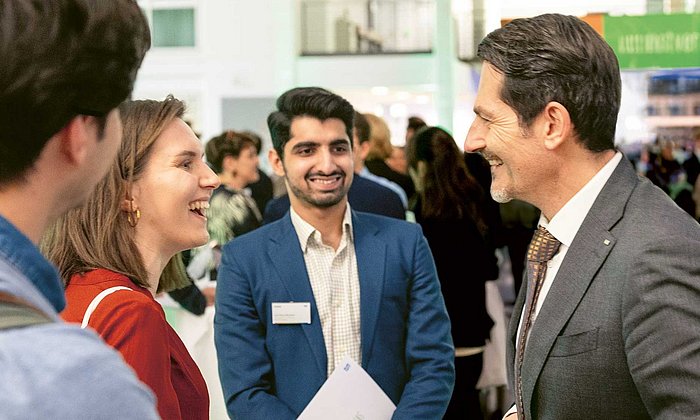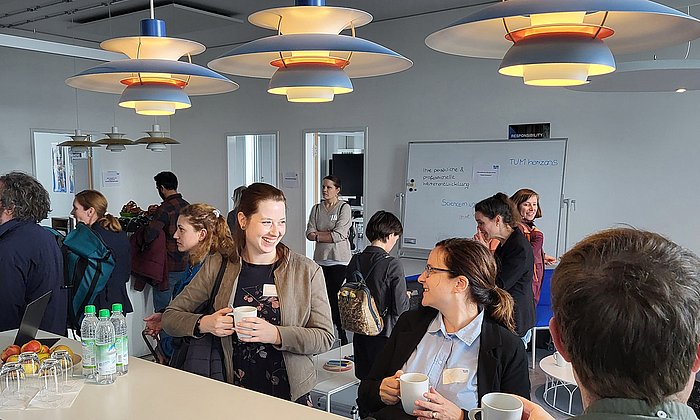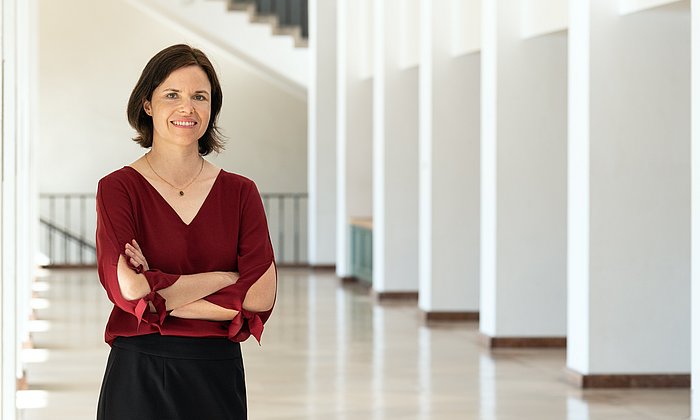Continuing education program Faculty@TUM
"Good Leadership is well worth it!"

What does good leadership mean in the world of science? Daniel Pittich has been working on this question for quite some time now. He completed vocational training as a carpenter, attended a technical secondary school and studied to become a teacher in technical vocational education. Ultimately, he earned his doctorate at Technical University of Darmstadt; he has particular memories of his doctoral thesis adviser: then attended a professional secondary school and studied at technical schools for a teaching degree. Ultimately he earned his doctorate at Darmstadt University of Technology; he has particular memories of his doctoral thesis adviser: "He showed appreciation when dealing with us and treated us as his equals," he says. "We had plenty of freedom, and we could always ask for feedback and support whenever we needed it."
Open doors, appreciative communication and recognition of staff members' scientific achievements: All a part of good leadership, says Daniel Pittich, currently TUM Professor of Technical Education. "I try to accompany the doctoral candidates in their development, to mentor them," he continues. And that's no small job with a team that has in the meantime grown to include 17 colleagues. Prof. Pittich already deals with the topic of leadership behavior; nevertheless, he says, "When choosing a scientific career path, as a rule the candidate receives no preparation for the topic of leadership."
Studies show that certain personal characteristics can be helpful in a scientific career: Thus an expert in a given field of research who is performance-oriented and does everything possible to maximize their own visibility with as many top-quality publications as possible will have better chances at landing a sought-after professorship. Once this milestone has been achieved, other qualities take on greater importance, such as the ability to listen, to lead teams and to provide staff members with specific support.
Actively shaping the transition to a leadership role
To support researchers in this transition from individual experts to team leaders, Professor of Research and Science Management Claudia Peus has joined together with the TUM Institute for LifeLong Learning team to develop the Faculty@TUM program: Among other things, the program offers newly appointed professors an introductory course on the topic of leadership and provides an online toolbox with tips and strategically selected materials, such as guidelines. Faculty members can attend workshops on a variety of aspects and discuss challenging leadership situations with one another in the "Lunch Series".
I found it very interesting to see how the team perceives my management style. I take this feedback very seriously.
Daniel Pittich has already participated in several workshops, including on the topic of Mental Health. He says the chance to obtain a personal leadership profile based on an evidence-based method, including the opinions of his staff members, was particularly valuable to him. "I found it very interesting to see how the team perceives my management style. I take this feedback very seriously," says Pittich. He discusses the results of the workshops with his team: "We keep asking ourselves: how do we want to work with one another and how can we develop further together? This mindset enables us to deal better with upcoming conflict situations.We can deal with conflict situations much better because we really live this out."
Prof. Peus says an appreciative and relaxed working climate is just one advantage of good leadership. The psychologist was able to demonstrate in a scientific study that the performance of a team, i.e. the number and quality of scientific publications, is affected by management style. Here, what's called a transformational management style is particularly helpful: Leaders communicate a higher-level goal, motivate their staff members and accompany them as mentors, setting an example on this journey. "This type of leadership helps make sure that every individual can realize their potential, making highest-level performance possible in the team," says Peus. The concept serves as the foundation for the workshops, the TUM Institute for LifeLong Learning offers.
The big picture instead of micromanagement
In spite of her busy calendar, Professor Li Deng also takes advantage of the services offered by Faculty@TUM, for example in staff acquisition and conflict management. The professor of Prevention of Microbial Infectious Diseases teaches and conducts research both at TUM and Helmholtz Munich. Her research group, originally two doctoral candidates and one postdoc researcher, has now grown to approximately 30 members distributed between two different institutions. "I try to maintain the same presence in both teams and plan my time accordingly," she says.
The best approach for her: Consciously avoiding micromanagement and delegating tasks. "I trust my staff and give them the freedom to independently fill out their areas of responsibility." She adds, "My role as team leader goes beyond management in the strictest sense: I want to inspire my people and pull them together behind the big picture, a single vision." Prof. Deng would like to see additional workshops and expanded training in the future, for example on the special challenges facing female leaders and for the middle management tier. In her role as TUM Senior Vice President for Talent Management and Diversity, Claudia Peus also follows these topics and drives continuing development of other programs with the TUM Institute for LifeLong Learning. And she's convinced: "This investment in leadership is well worth it – for the researchers and their teams, and for the university as a whole."
The TUM Institute for LifeLong Learning's Faculty@TUM program supports TUM professors in handling interdisciplinary leadership and management tasks. The program offers this target group custom-tailored continuing education events, online resources and networking opportunities.
Technical University of Munich
Corporate Communications Center
- Undine Ziller
- undine.ziller@tum.de
- presse@tum.de
- Teamwebsite




